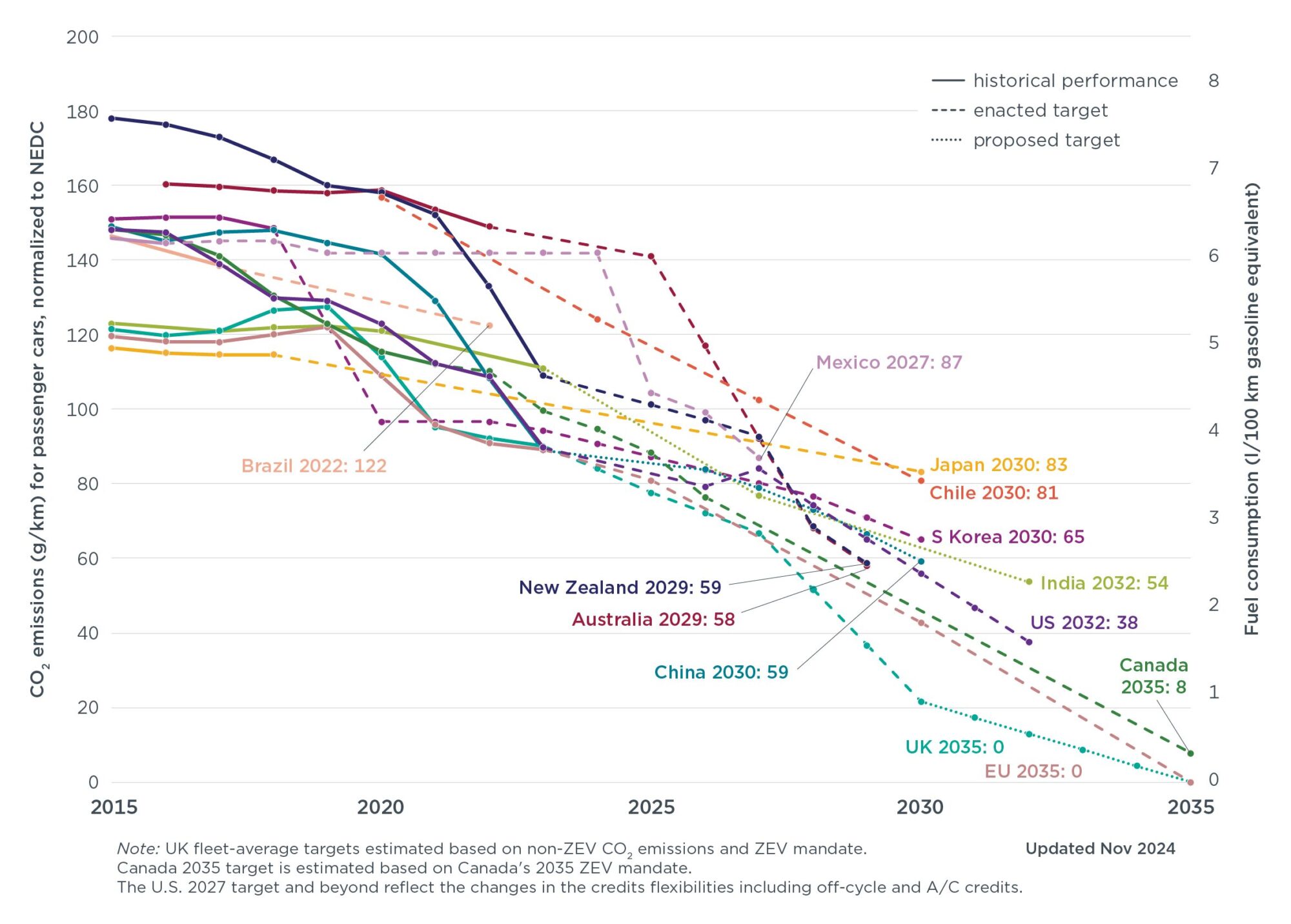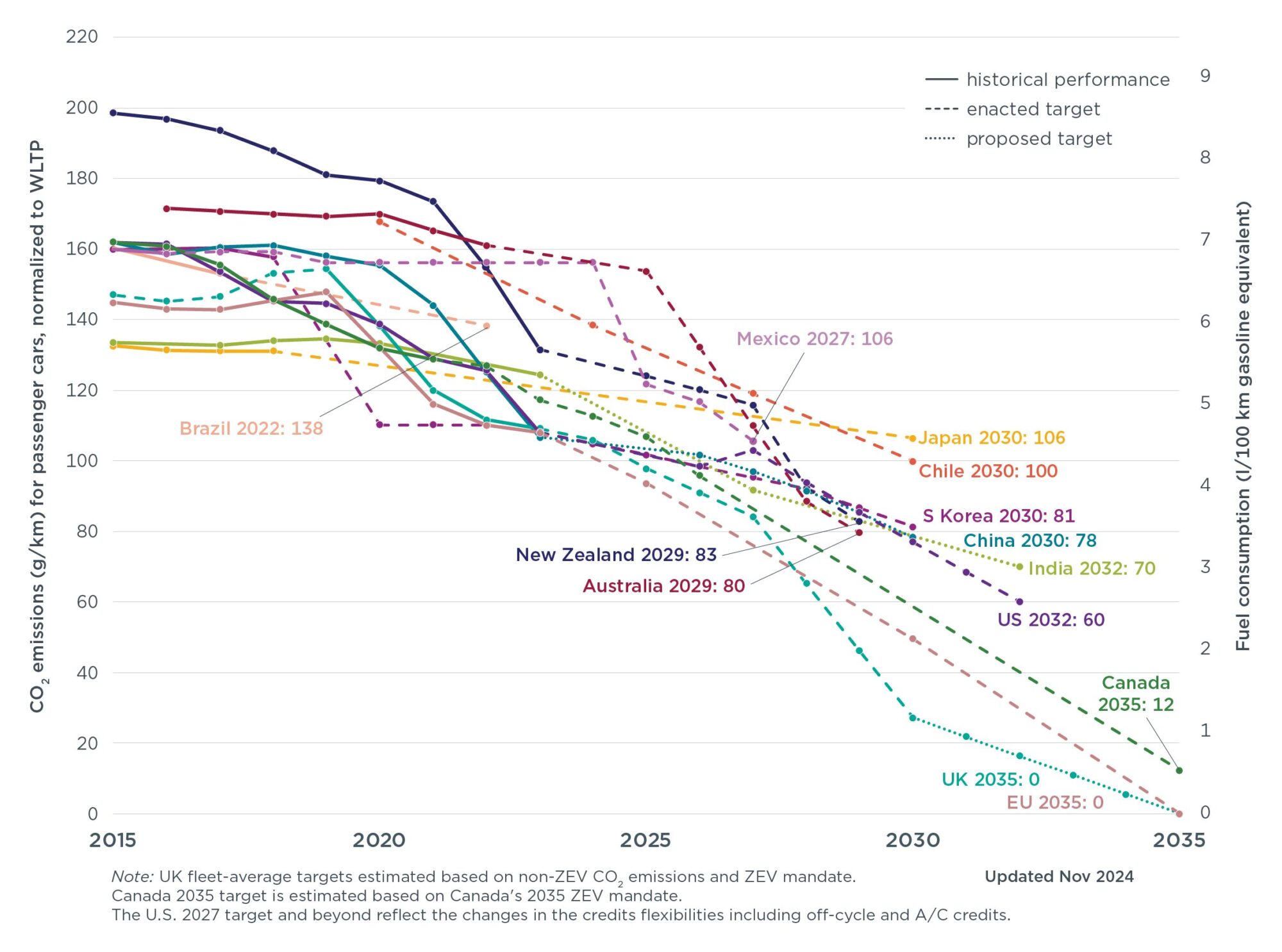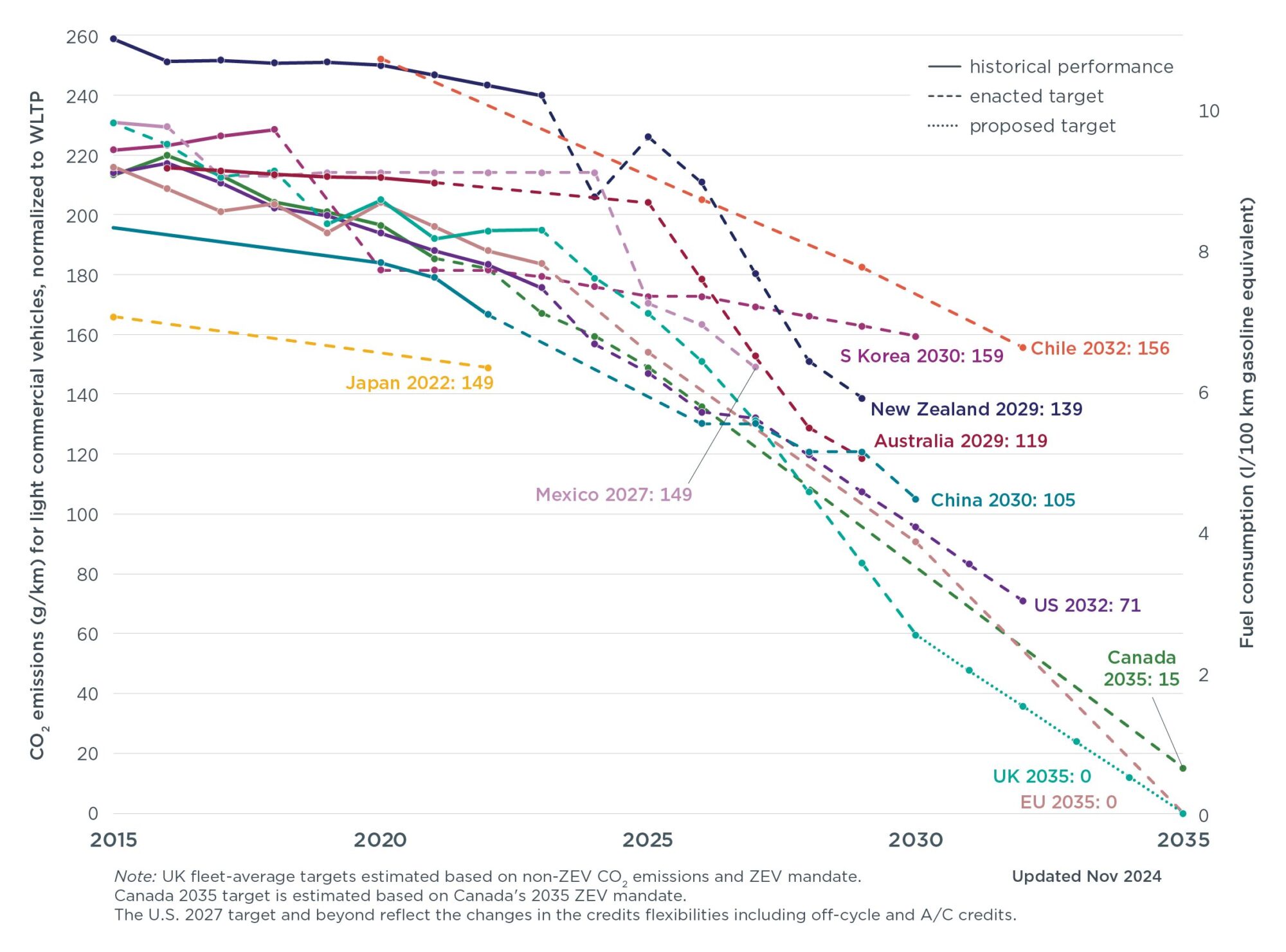Efficiency and GHG standards: Light duty
Verified on 22 December 2025
Historical and projected GHG and fuel efficiency standards for passenger cars normalized to NEDC standards (gCO2/km)

Source: ICCT research, please see table below for more details.
Historical and projected GHG and fuel efficiency standards for passenger cars normalized to WLTP standards (gCO2/km)

Source: ICCT research, please see table below for more details.
Historical and projected GHG and fuel efficiency standards for light trucks normalized to NEDC standards (gCO2/km)

Source: ICCT research, please see table below for more details.
Historical and projected GHG and fuel efficiency standards for light trucks normalized to WLTP standards (gCO2/km)

Source: ICCT research, please see table below for more details.
GHG and fuel efficiency standards for light duty vehicles by applicable vehicle types
| Policy Name | Policy Status | Summary | Publication Year | PC | LCV |
|---|---|---|---|---|---|
| Australia New Vehicle Efficiency Standard (NVES) Act | adopted | New CO2 emission reduction targets for new passenger cars and light commercial vehicles sold from 2025 to 2029. Starting in 2025, CO2 emission reduction targets are 141 gCO2/km for cars and 210 gCO2/km for light commercial vehicles, dropping annually to 58 gCO2/km and 110 gCO2/km respectively by 2029. The procudure is the NEDC test cycle. | 2024 | Yes | Yes |
| California Advanced Clean Car II (ACC II) GHG Standard | legally challenged | Reducing fleet level emissions for passenger cars and light commercial vehicles by 50% by 2035 compared to 2026 levels. By model year 2030, the target average CO2 emissions from all new passenger cars sold is no more than 121 gCO2/mile. Note: Federal authority to enforce these rules was revoked by the Congressional Review Act in June 2025, but the state is suing to defend the rule. | 2022 | Yes | Yes |
| Canada Regulations Amending the Passenger Automobile and Light Truck Greenhouse Gas Emission Regulations | adopted | Reducing fleet level emissions for passenger cars and light trucks by 30% between 2017 and 2025 with annual targets. The baseline value for passenger cars in 2022 is 221 gCO2/mile and that for light trucks is 312 gCO2/mile. The test procedure is CAFE. | 2014 | Yes | Yes |
| Chile LDV GHG Standard | adopted | Reducing fleet level fuel efficiency for passenger cars and light trucks by approximately 50% in 2030. The base year is 2020. The baseline value for passenger cars is approximately 14.9 km/lge and that for light commercial vehicles is approximately 13.5 km/lge. The test procedure is CAFE. | 2022 | Yes | Yes |
| China Stage 4 Fuel Consumption Standard for Light Commercial Vehicles | adopted | Reducing the fleet-average fuel consumption for light commercial vehicles by 10% over Stage 3 and introduces a corporate average fuel consumption (CAFC) standard. The new test procedure is NEDC. | 2024 | No | Yes |
| China Phase V Fuel Efficiency Standard | adopted | Improving fleet level fuel efficiency for passenger cars from 5.8 l/100 km in 2019 to 4 l/100 km in 2025 and 3.2 l/100 km in 2030. The test procedure is WLTP. | 2019 | Yes | No |
| China Phase VI Fuel Efficiency Standard | proposed | Lowering the fleet-averagel fuel consumption for new passenger cars to 3.2 l/100km by 2030, down from the Phase V target of 4.6 l/100km. The rule will be in effect in 2026. The test procedure is NEDC. | 2024 | Yes | No |
| European Union Revision of CO Emission Standards for Cars and Vans | adopted | The European Commission proposed a revision of the CO2 emissions standards for cars and vans, giving carmakers more flexibility in meeting their 2025 EV sales targets. Instead of an annual deadline, the new framework introdues a collective compliance period from 2025 to 2029. | 2025 | Yes | Yes |
| European Union CO₂ Emission Standards for Cars and Vans (Fit for 55) | adopted | Reducing fleet level emissions for new cars and vans by 50% (vans) and 55% (cars) by 2030, and 100% in 2035 compared to 2021 levels. The baseline value for passenger cars in 2021 is 115 gCO2/km and that for light commercial vehicles is 176 gCO2/km. Targets applying from 2021 forward are based on the WLTP. | 2024 | Yes | Yes |
| India CAFE III Standards | proposed | Reducing fleet level emissions for new passenger cars and light trucks to 91.7 gCO2/km from 2027-2032. The test procedure will shift from MIDC to the WLTP. | 2025 | Yes | No |
| Japan Law Concerning the Rational Use of Energy 2019 Amendment | adopted | Reducing fleet level emissions for passenger cars by 28% in 2030. The base year is 2018. The baseline value for passenger cars is 128 gCO2/km. The test procedure is WLTP. | 2019 | Yes | No |
| Malaysia LDV GHG Standard | proposed | 2024-2026: National target of 123gCO2/k for passenger vehicles; 2027-2030: National target of 95 gCO2/km for passenger vehicles | 2021 | Yes | No |
| Mexico LDV Phase 2 GHG Standard | adopted | Reducing fleet-level emission for both passenger cars and light trucks, with targets of 89 gCO2/km by 2027 for passenger cars and 131 g CO2/km for light commercial vehicles. The test procedure is CAFE. | 2024 | Yes | Yes |
| Mexico LDV Phase I GHG Standard | adopted | Reducing fleet level emissions for passenger cars and light trucks by 36% and 26% respectively in 2025. The base year is 2018. The baseline value for passenger cars is 140 gCO2/km and for light commercial vehicles is 192 gCO2/km. The test procedure is CAFE. | 2024 | Yes | Yes |
| New Zealand Clean Vehicle Act Amendment | adopted | Reducing fleet-level emission for new passenger cars and light trucks by 41-42% between 2025 and 2029. Starting in 2025, CO2 emission reduction targets are 112.6 gCO2/km for cars and 223 gCO2/km for light trucks, dropping annually to 65 gCO2/km and 131 gCO2/km respectively by 2029. The test procedure is WLTP. | 2021 | Yes | Yes |
| South Korea 2030 GHG Standard | adopted | Reducing fleet level emissions for passenger cars and light trucks by 28% in 2030. The base year is 2020. The baseline value for passenger cars is 97 gCO2/km and that for light commercial vehicles is 166 gCO2/km. The test procedure is CAFE. | 2024 | Yes | Yes |
| US CAFE Standards for Passenger Cars and Fuel Efficiency for HDPUV | superseeded | Increase stringency at 2% per year for passenger cars and 2% per year for light trucks, year over year from MY2027-2031. Base year 2027. Increase stringency at 10% every two years for HDPUVs, year over year from MY2030-2035. The base year is 2030. The test procedure is CAFE. Note: In December 2025, NHTSA proposed the SAFE Vehicle Rule III, introducing rollbacks to the current CAFE standards. | 2024 | Yes | Yes |
| US Safer Affordable Fuel-Efficient (SAFE) Vehicle Rule III for LDVs | proposed | Lowers required required targets, projecting a decrease in the industry fleetwide average from the previous 50.4 mpg to 34.5 mpg by the Model Year 2031. Key changes include elimination of inter-manufacturer credit trading from MY 2028+ and operating under the congressionally mandate $0 civil penalty for noncompliance. | 2025 | Yes | Yes |
| US EPA Multipollutant Standards for LDVs and MHDVs | Under review | Reducing GHG emissions by 11% per year for LDVs sold from 2027-2032, up from 8% over year for the previous standards covering model years 2023-2026. Note: As of August 2025, the stringent GHG rule for MY 2027+ is under review by the current administration. | 2024 | Yes | Yes |
